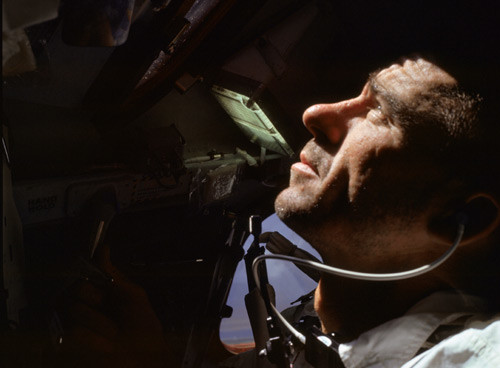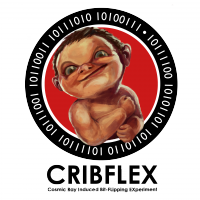Posts by: Tamela Maciel
Pushing towards the human–Martian frontier

Eye on the sky: NASA astronaut Walter Cunningham during the Apollo 7 mission, in October 1968. (Courtesy: NASA)
By Tamela Maciel at the National Space Centre in Leicester
Last week, the planet Mars was under the international spotlight once more as NASA scientists announced that liquid water may still be flowing on the surface of the red planet. Also, the much-anticipated film adaptation of The Martian – a 2011 novel by American author Andy Weir – a science-driven story of human survival on Mars, hit the box office. Mars was also the hot topic at a recent event held at the National Space Centre in Leicester. The guest of honour was Apollo 7 astronaut Walter Cunningham and throughout the hour-long Q&A, he emphasized the need to push the “next frontier” and send humans to Mars.
Cunningham is not a man lacking in confidence or the experience of pushing boundaries. When asked if he ever felt the pressure of the astronaut selection or training process, he said “I thought I could fly anything, any time, anywhere. Was that true? I don’t know. But that’s how I felt.”
View all posts by this author | View this author's profile
Balloon-borne experiment will reveal how cosmic rays damage computer memories
By Tamela Maciel at the APS April Meeting in Baltimore, Maryland

Little bits: the CRIBFLEX logo. (Courtesy: Drexel University Society of Physics Students)
A group of undergraduate students at Drexel University in Philadelphia is ready to click “confirm” on an Amazon order that will include a weather balloon, a memory storage device, a GPS, a Geiger counter and a BeagleBoard computer (described to me as a “beefier version of Raspberry Pi”). For less than $2000, this team of physics, engineering and computer-science students plans to launch a weather-balloon experiment that will measure the effects of cosmic rays on DRAM memory devices at high altitudes.
The team is part of the Drexel University Society of Physics Students and the members presented their experiment design at the April Meeting of the American Physical Society in Baltimore, Maryland, last weekend.
DRAM is a very quick and simple type of electronic memory – each bit takes the form of a capacitor that either has charge or doesn’t, according to whether it’s storing a zero or one. Unfortunately, this simple design can make the bits very sensitive to radioactivity or cosmic rays, which can cause bits to flip values and introduce “soft errors” into the data.